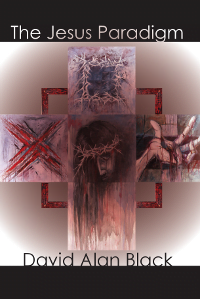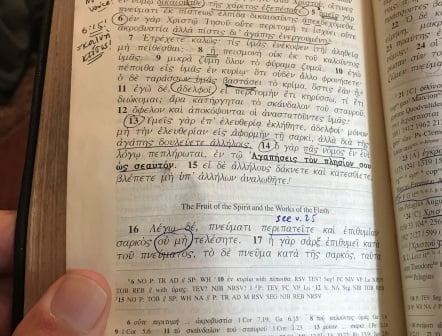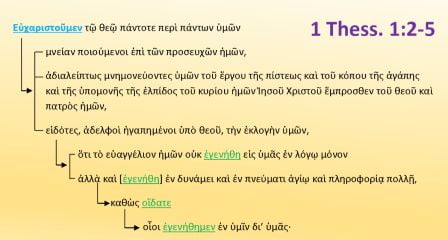Sunday, February 17
7:10 PM I’m warning you: This post is long and boring and I won’t be offended in the least if you leave now. In the Greek classes I teach we discuss words and how they take on meaning. It’s all part of an effort to make classes practical and motivational. At the same time, there’s nothing easy about lexical analysis. Much of it is undoing damage. Take the well-known and much-discussed fallacy of etymologizing — determining a word’s meaning by its parts. For example, some insist that a New Testament church is “called out” from the world — separate, if you will — based on the etymology of the Greek word ekklesia, which is comprised of two parts—ek, “out of,” and kaleō, “I call.” Hence the church is a “called out” organism. It is to be different from the world. And believers are to separate themselves from the world.
In New Testament usage, however, the word ekklesia never quite had this meaning of “called out ones.” Normally it was used to describe a group of people that had something in common. At times this group met, and then it was an ekklesia. At other times it wasn’t meeting per se, but even then it was an ekklesia. This term was used in contrast to ochlos — a term that describes a group of people that have come together and have nothing in common. Ochlos is often glossed as “crowd” in English, and that is indeed a very good rendering. How, then, should we translate ekklesia into English? When I pose this question in my classes, I usually get several excellent responses: “gathering,” “assembly,” “congregation,” and the like. All of these are fine, but none of them in my opinion captures the essence of what a New Testament ekklesia is. I prefer the term “community.” Church is not simply a group of just any people, and it is most certainly not a building. Instead, I like to think of a church as a space in which all of usare ministering, praying, preaching, teaching, singing, caring, loving — a family if you will. Our motto might be: “We’re all in this together. So let’s do it together.” This is the community to which we, as followers of Jesus, are giving ourselves with our whole hearts. This is our “church” — a diverse, global, caring paean of praise to our Creator, Redeemer, Sustainer, Lord, Master, and only true Senior Pastor.
As you know, in recent years I’ve become part of a similar community, one known simply as the “running community.” The similarities between this community and the “church” are legion. As soon as I began running competitively, I knew I had joined the ranks of hundreds and thousands of other runners. From my very first race this sense of community became instilled deep within my psyche. Even as a novice runner, I knew I was not alone. Every experienced runner remembers when they were a beginner just like you, and so they are eager to reach out to the newbies among them. You soon have a group of running friends you look to for advice — where to buy the best running shoes, how to train properly, how to avoid injuries, how to handle anxiety before a big race. Being part of this community helps each of us become a better runner. As runners, we value what we can become and not simply what we look like. We are not defined by our age, our t-shirt size, our weight, or our medallions (or lack of them). We are all fiercely independent and pursue individual goals, and yet paradoxically we truly believe that we are all in this together, and it shows. Just show up to any race and observe the runners.
I’m not in the least surprised, therefore, to find similarities between a running community and a community that defines itself on the basis of the traditional creedal values of faith, hope, and love. Both runners and Christians have a lot in common. For one thing, we both ask silly questions. A Christian in a bookstore asks the salesperson: “I’m looking for a Bible for my mother, but I’m not sure who the author is.” A novice runner asks you, “How far is your next 5K race?” As you can see, both novice runners and novice Christians have a lot to learn. We are people who pursue excellence and who seek to be dedicated to something wholeheartedly and to give ourselves to some project without any reservations whatsoever. Our actions are always impelled by some good we want to attain. And to achieve our goals, we often have to endure suffering and pain. An athletic race is a place where we discover strength and faith and courage we never knew we possessed. We are runners. It doesn’t matter how fast we run or how far we run. It doesn’t matter whether we are running in our very first race or have been running for fifty years. During a recent 5K race I met an athletic-looking young man who was pushing his infant child in a stroller. We had finished the race about the same time. I knew he could have run much faster had he not been pushing a baby carriage. He told me something I’ll never forget. He said, “Sometimes having the best time at a race has nothing to do with how fast you ran.” I will remember that until the day I die. I wish I could have given him “The World’s Greatest Runner Award” that day. Folks, the Christian life is a race we run together. It’s no different in the running community. “Hey guys. I’ve got a hip labral tear. Anybody had any experience with this?” Or (in the church), “As a mom, I have a tremendous sense of responsibility to teach my children about truth and grace and God. Should I make my children read the Bible? What do you think?” The point is: We are there for each other.
As I’ve gotten older, I’ve found my priorities changing. I find myself wanting richer, more intimate and complex relationships with my family and friends. Like women, men have a primal need for closeness. We were created for relationships. Men discover that as they move into middle and older age they also move from competition to connecting. The best corporate managers are those who foster networks of connectivity. The best professors, too, prize being hands-on guides and mentors to their students, and not only disseminators of information. Before Becky died, she was the one who did most of the connecting with our kids on an emotional level. But as I’ve come into my own as a widower, I’ve come to a realization that emotionally connecting with my kids and grandkids is deeply enriching. One of the things that my loss of Becky did for me personally was to make me value and cherish my family more. It’s like taking the barnacles off. Now is the time in life to enjoy my family. The real ideal of manhood here is “servant-leader” in which we men discover our nurturing side. The apostle Paul had a lot to say about love. He knew that love is not blind. Nobody is perfect, least of all those closest to us. What is necessary in love is the ability to see others as God sees us. And to love others correctly, we must first love ourselves. The self must first be strong and whole before we can offer true and lasting love to others. Love is a positive sum game where both sides can and should win.
Which brings me back to the notion of community. An athletic team has goals that far surpass the aspirations of its individual players. And that’s true of all of life. As I look forward to the winter of my life, I want to be a man who joins the “I” to the “we,” whether that’s in my family, my church, my profession, my mission work, and even my hobbies. Saying I want to do this is quite easy. Becoming the self I want to become is quite difficult. But every healthy relationship at least makes an attempt to meld the “I” with the “we.”
Well, that’s the end of my ridiculously long blog post. If you’re not bored to tears, then clearly you’re a blog junky like me. If you made it to the end, you deserve a cookie!
(From Dave Black Onlind, used by permission.)
Featured image credit: Pixabay.
Spoken beautifully.













